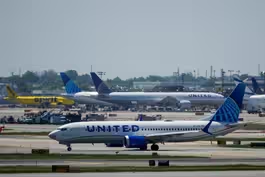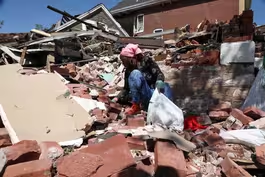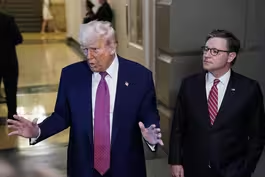
Is defending Taiwan vital to U.S.? Experts offer views
Clip: 5/20/2025 | 9m 35sVideo has Closed Captions
Is defending Taiwan a vital U.S. interest? Experts offer differing views
Taiwan has long been a tense flashpoint between Washington and Beijing. By law, the U.S. is required to help Taiwan defend itself. But there is now a debate about whether Taiwan is spending enough on defense, whether Ukraine is a distraction or a test case, and whether defending Taiwan is a vital U.S. interest. Nick Schifrin discussed more with Randall Schriver and Michael Swaine.
Problems playing video? | Closed Captioning Feedback
Problems playing video? | Closed Captioning Feedback
Major corporate funding for the PBS News Hour is provided by BDO, BNSF, Consumer Cellular, American Cruise Lines, and Raymond James. Funding for the PBS NewsHour Weekend is provided by...

Is defending Taiwan vital to U.S.? Experts offer views
Clip: 5/20/2025 | 9m 35sVideo has Closed Captions
Taiwan has long been a tense flashpoint between Washington and Beijing. By law, the U.S. is required to help Taiwan defend itself. But there is now a debate about whether Taiwan is spending enough on defense, whether Ukraine is a distraction or a test case, and whether defending Taiwan is a vital U.S. interest. Nick Schifrin discussed more with Randall Schriver and Michael Swaine.
Problems playing video? | Closed Captioning Feedback
How to Watch PBS News Hour
PBS News Hour is available to stream on pbs.org and the free PBS App, available on iPhone, Apple TV, Android TV, Android smartphones, Amazon Fire TV, Amazon Fire Tablet, Roku, Samsung Smart TV, and Vizio.
Providing Support for PBS.org
Learn Moreabout PBS online sponsorshipGEOFF BENNETT: Today, Taiwan's president, Lai Ching-te, marked one year in office.
In a speech, he said Taipei seeks peace and dialogue with Beijing, but warned that Taiwan must not harbor any illusions and should continue to strengthen its defenses.
China, which views Taiwan as a breakaway province, has labeled Lai a separatist.
Nick Schifrin is here with the final part of our series, Taiwan: Risk and Resistance.
NICK SCHIFRIN: Taiwan has long been the most tense flash point between Washington and Beijing.
By law, the U.S. is required to help Taiwan defend itself, and the U.S. trains Taiwanese soldiers, sells Taiwan weapons, and in recent years has advanced regional alliances while expanding its own military presence.
Beijing vows to unite with Taiwan peacefully or by force, and the Chinese military regularly exercises around Taiwan.
There is now a public debate about whether Taiwan is spending enough on its defense, whether Ukraine is either a distraction or a test case, and whether defending Taiwan is a vital U.S. interest.
So, to have that debate, we have two views.
Randall Schriver was assistant secretary of defense for Indo-Pacific affairs during the first Trump administration.
He is now chairman of the Institute for Indo-Pacific Security.
And Michael Swaine is a senior research fellow at the Quincy Institute for Responsible Statecraft and writes extensively about security issues in Asia.
Thanks very much, both of you.
Welcome to the "News Hour."
Randy Schriver, let me start with you.
Is defending Taiwan a vital U.S. interest?
RANDALL SCHRIVER, Former U.S. Assistant Secretary of Defense for Indonesia-Pacific Affairs: Well, our law says any threat to Taiwan is of grave concern, and that's a view that's been held for decades.
Taiwan is clearly very important to us across the spectrum of issues, economic and trade issues.
We all know the semiconductor story, the geography being really central in the region with proximity to things we care a lot about, South China Sea, East China Sea.
It's a partner in so many different efforts, assisting Ukrainian refugees in Poland, Ebola in Western Africa, so it's a like-minded partner.
So I think it certainly merits at least meeting what our law says, have the capacity to resist force and help Taiwan defend itself.
NICK SCHIFRIN: Michael Swaine, is defending Taiwan a vital U.S. interest?
MICHAEL SWAINE, Quincy Institute for Responsible Statecraft: If you put it that way, defending Taiwan to the point of going to war with China, I don't believe is a vital U.S. interest, no.
I think, if you define a vital interest in exactly those terms, what is the United States willing to go to full-fledged war over, this time with a major nuclear power, then I would say Taiwan does not meet that bar.
Taiwan has never been regarded as a strategically critical location for the United States in Asia.
At one time, there was an effort to define it in that way, but that never succeeded.
That was never the underlying assumption behind the One China policy or the Taiwan Relations Act with the United -- with -- in U.S. law.
And the issue of credibility, people say that Taiwan should be defended because, if the United States doesn't defend Taiwan, its credibility in Asia will be lost, allies will no longer have confidence in the United States.
I don't believe that that's the case.
NICK SCHIFRIN: Randy Schriver, take on those ideas, credibility and critical geography.
RANDALL SCHRIVER: Credibility, I disagree.
And we hear from partners and allies about this issue directly.
So we may have an opinion that, but it's -- the credibility will be in the eyes of our partners and allies.
And Japan has said Taiwan's security is Japan's security.
That was the exact quote from Shinzo Abe.
So I think there is a credibility issue here, in that we have a law that's been upheld for decades.
We have commitments.
The last president of the United States said we would defend Taiwan.
So I do think credibility is a concern.
NICK SCHIFRIN: Michael Swaine, allies, including the former prime minister of Japan that Randy mentioned, but also leaders of South Korea, Australia, Philippines, are more willing to talk about Taiwan than they were in the past.
MICHAEL SWAINE: Sure.
They're more willing to talk about Taiwan.
They're more willing to say Taiwan is an important location.
They want peace and security in the Far East.
For sure, they do.
Are they willing to go to war with China over that issue?
And my answer is, no, they're not.
If you take public opinion polls in Japan of the Japanese and you ask them, would you be willing to go to war alongside the United States to defend Taiwan against China, the response that says yes is a little over 10 percent of the Japanese people.
The vast majority of the Japanese people say no, we would not.
NICK SCHIFRIN: Randy Schriver, we talk a lot about deterrence.
Is Washington doing enough to assure Beijing that, whether it's about restraining Taipei in terms of how far they're going to go or restraining our own language about Taiwan?
RANDALL SCHRIVER: We have decades of a record of restraint.
We don't recognize the government in Taipei.
We restrict the level of contact and whether or not high-level officials can go to Taiwan and vice versa.
We have been very modest in terms of the security assistance we have provided and made sure it's of a defensive nature.
So we have decades of this experience and I think a very good track record.
What we're seeing from Beijing now is a lot more coercion and intimidation and aggression, an unwillingness to talk to the government in Taipei.
So I think assurance, reassurance is part of the equation, but I think our record on that is very good.
And we haven't really landed in a place where Beijing is willing to back off its intimidation and coercion campaigns.
NICK SCHIFRIN: Michael Swaine, is Washington doing enough to assure Beijing?
MICHAEL SWAINE: No.
I think you have to look at this situation as an interaction.
Both the United States and China, and, I should say, Taiwan as well are contributing to a worsening of the situation, where neither side has as much confidence in the word of the other side that it had in the past.
I think the United States has eroded its One China policy.
I think it's become much more loose in what it defines as unofficial relations with Taiwan.
I think it has had senior U.S. defense officials say that Taiwan is a strategic node that is critical to the U.S. defense posture in Asia, which is not congruent with U.S. policy at all.
NICK SCHIFRIN: There's a question of whether Taiwan is spending enough.
President Trump has called Taiwan to spend 10 percent of its GDP on defense.
Taipei says it can't afford that, but it is trying to get over 3 percent of spending of GDP.
But take a listen to what the top Defense Department policy official today, Elbridge Colby, said during his confirmation hearing about Taiwan.
ELBRIDGE COLBY, U.S.
Undersecretary of Defense for Policy: I don't think it's fair to Americans to ask Americans and our service men and women to suffer at great -- if our allies are not pulling their weight, but also that it won't even be capable -- viable.
NICK SCHIFRIN: Randy Schriver, let me start with you.
Is the U.S. defense of Taiwan not viable, as Bridge Colby said, and is Taiwan failing to pull it own weight?
RANDALL SCHRIVER: Taiwan is spending more on its own defense.
I think it's up to 2.4 percent of GDP now.
As you noted, the president is committed to getting to 3 percent, and that's a floor, not a ceiling.
So they're going in the right direction.
They're also spending on things related to national resilience, which don't get counted in the defense budget, but more secure communications, energy stockpiles, other kinds of support for continuity of government, civil defenses.
All these things aren't counted, and they're investing more heavily there.
So I do think they're moving in the right direction.
They have the will to defend themselves and are making the investments that they can make given their political environment.
NICK SCHIFRIN: Michael Swaine, do you agree with Bridge Colby?
MICHAEL SWAINE: I believe that Taiwan certainly isn't spending enough.
I do believe that Taiwan needs to spend a good deal more.
I don't think it can spend 10 percent of its GDP structurally.
That's not going to happen.
But I think it could do a lot more.
If, as Randy says, the Taiwanese are doing more in that area, then I applaud that.
I think that's good, because, as I'm saying, I don't think Taiwan should be thrown under the bus.
The United States should be supporting Taiwan in every way possible, except through military intervention.
NICK SCHIFRIN: Let me move to Ukraine.
When I was in Taiwan, it was very clear that Taiwanese people, the military, the government was very focused on what happens in Taiwan and also the fate of the Washington-Kyiv relationship.
But, today, Secretary of State Marco Rubio, while acknowledging the ties between Ukraine, Washington and Beijing, said that Ukraine was a distraction from China.
MARCO RUBIO, U.S. Secretary of State: Every minute we spend, every dollar we spend on this conflict in Europe is distracting both our focus and our resources away from a potential for a much more serious and much more cataclysmic confrontation in the Indo-Pacific.
NICK SCHIFRIN: Randy Schriver, is it more important to focus and send resources to the Western Pacific than it is to get Ukraine right?
RANDALL SCHRIVER: I do see the theaters as related.
And I have said that I think the best way to deter Xi Jinping is to make sure Putin fails in his efforts in Ukraine.
They're very close.
China is watching very carefully what's happening on the battlefield.
They're extracting lessons learned.
And I think it's giving them some degree of pause.
NICK SCHIFRIN: Michael Swaine, is there a connection between Ukraine and Taipei?
And what is it?
MICHAEL SWAINE: I do support the arrival of a cease-fire in the Ukraine situation, not really to devote more resources to dealing with China and Asia, but because that war needs to come to an end.
And if you then turn to say, well, what should we be doing vis-a-vis the Chinese in the Western Pacific, my argument is not we just need to pull out our resources from Ukraine and then double down on defense spending in the Pacific.
It's not a simple matter of devoting more resources to the Western Pacific.
It's really a political issue, first and foremost, regarding Taiwan, and only secondarily is it a military issue.
NICK SCHIFRIN: Michael Swaine, Randy Schriver, thanks very much.
RANDALL SCHRIVER: Thank you.
Ex-FAA official discusses near misses and outages
Video has Closed Captions
Clip: 5/20/2025 | 5m 27s | 'Vintage' air traffic system to blame for near misses and outages, ex-FAA official says (5m 27s)
Jonathan Capehart on his new memoir 'Yet Here I Am'
Video has Closed Captions
Clip: 5/20/2025 | 7m 22s | Jonathan Capehart chronicles his journey toward self-discovery in 'Yet Here I Am' (7m 22s)
News Wrap: UN says aid still not reaching Gaza
Video has Closed Captions
Clip: 5/20/2025 | 6m 7s | News Wrap: UN says aid still not reaching Gaza (6m 7s)
Spring storms spark FEMA scrutiny as Trump overhauls agency
Video has Closed Captions
Clip: 5/20/2025 | 7m 4s | Spring storms spark scrutiny of FEMA as Trump overhauls and slashes the agency (7m 4s)
Tribal colleges face uncertain future amid funding cuts
Video has Closed Captions
Clip: 5/20/2025 | 7m 54s | Tribal colleges face uncertain future amid federal funding cuts (7m 54s)
Trump pushes GOP holdouts to support his domestic bill
Video has Closed Captions
Clip: 5/20/2025 | 7m 2s | Trump pushes GOP holdouts on Capitol Hill to support his massive domestic policy bill (7m 2s)
Providing Support for PBS.org
Learn Moreabout PBS online sponsorship
- News and Public Affairs

FRONTLINE is investigative journalism that questions, explains and changes our world.

- News and Public Affairs

Amanpour and Company features conversations with leaders and decision makers.











Support for PBS provided by:
Major corporate funding for the PBS News Hour is provided by BDO, BNSF, Consumer Cellular, American Cruise Lines, and Raymond James. Funding for the PBS NewsHour Weekend is provided by...






